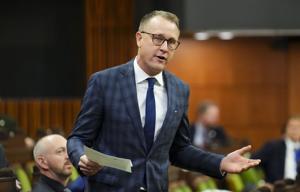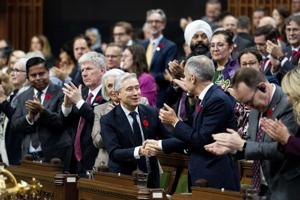Politics
U.K. Government to Revamp Asylum System Amid Rising Migrant Numbers

The British government has announced plans to overhaul its asylum system in a bid to reduce immigration and address the ongoing political turmoil surrounding migrant crossings in the English Channel. Home Secretary Shabana Mahmood is set to unveil a series of significant reforms on Monday in the House of Commons, which are inspired by Denmark’s approach to asylum applications. These changes aim to make the U.K. less appealing to individuals seeking refuge and streamline the removal of migrants who do not qualify for asylum.
Mahmood emphasized the moral imperative of controlling borders while addressing public concerns over a system that many perceive as ineffective. The issue of migration has become increasingly contentious, contributing to the rise of the hard-right Reform UK Party. The Home Secretary, who is the daughter of migrants, defended her party’s stance, asserting that the ruling Labour Party is not adopting far-right rhetoric. “People can see huge pressure in their communities and they can also see a system that is broken,” she stated in an interview with the BBC.
Despite various attempts by successive governments to curb the influx of migrants, including a controversial plan from the previous Conservative government to relocate asylum seekers to Rwanda, the number of arrivals continues to rise. In 2023 alone, more than 39,000 migrants have reached U.K. shores by boat, surpassing the 37,000 arrivals recorded in 2022. While these figures indicate a growing trend, they still represent a small fraction of total immigration, as the majority of individuals enter the country legally via visas.
According to the latest figures from the Office for National Statistics, net migration hit a record high of over 900,000 in the year leading up to June 2023, with significant contributions from individuals fleeing conflicts in Ukraine and the political crackdown in Hong Kong. In contrast, net migration was reported at 431,000 in the year to June 2025, reflecting a 49.9% decrease from the previous year.
As the summer progressed, the political landscape around migration became even more fraught. Protests, some escalating into violence, occurred outside hotels housing asylum seekers after a migrant was arrested and later convicted for a serious crime. These events have intensified public scrutiny and pressure on the government to respond decisively.
The proposed reforms include the revocation of the U.K.’s legal obligation, established under EU law in 2005, to provide support for asylum seekers. This means that the government could withdraw housing and financial support currently guaranteed to those seeking refuge. Additionally, benefits may be denied to individuals who have the right to work but choose not to, as well as those who break the law. Regular reviews of refugee status will also be implemented to assess whether individuals can be safely repatriated.
In response to the ongoing challenges faced by migrants attempting perilous crossings, the government plans to establish designated safe routes for asylum claims, aiming to reduce the dangerous practices currently employed by many.
Despite the announced reforms, some critics, including Conservative MP Chris Philp, have voiced concerns that these changes merely “tinker” at the edges of the issue. Philp argued that the reforms would lack the effectiveness of the previously proposed Rwanda policy and insisted that all migrants entering the U.K. without authorization should be deported within a week. “It’s gimmicks. It’s rearranging the deck chairs on the Titanic,” he remarked during a BBC interview, emphasizing the need for more substantial action.
The Home Office has highlighted Denmark’s recent success in reducing asylum applications to their lowest level in four decades, pointing to the removal of 95% of those who sought to settle there. Once considered a haven for refugees, Denmark has faced international criticism for its strict immigration policies, which aim to limit the number of newcomers amidst a global context of mass migration driven by conflict, famine, and poverty.
As the U.K. government prepares to implement these changes, the implications for migrants and the broader political landscape remain to be seen. The upcoming announcements will undoubtedly shape the future of asylum policy in the country and influence ongoing debates surrounding immigration and border control.
-

 Politics1 week ago
Politics1 week agoSecwepemc First Nation Seeks Aboriginal Title Over Kamloops Area
-

 World4 months ago
World4 months agoScientists Unearth Ancient Antarctic Ice to Unlock Climate Secrets
-

 Entertainment4 months ago
Entertainment4 months agoTrump and McCormick to Announce $70 Billion Energy Investments
-

 Lifestyle4 months ago
Lifestyle4 months agoTransLink Launches Food Truck Program to Boost Revenue in Vancouver
-

 Science4 months ago
Science4 months agoFour Astronauts Return to Earth After International Space Station Mission
-

 Technology3 months ago
Technology3 months agoApple Notes Enhances Functionality with Markdown Support in macOS 26
-

 Top Stories1 month ago
Top Stories1 month agoUrgent Update: Fatal Crash on Highway 99 Claims Life of Pitt Meadows Man
-

 Sports4 months ago
Sports4 months agoSearch Underway for Missing Hunter Amid Hokkaido Bear Emergency
-

 Politics3 months ago
Politics3 months agoUkrainian Tennis Star Elina Svitolina Faces Death Threats Online
-

 Politics4 months ago
Politics4 months agoCarney Engages First Nations Leaders at Development Law Summit
-

 Technology4 months ago
Technology4 months agoFrosthaven Launches Early Access on July 31, 2025
-

 Top Stories3 weeks ago
Top Stories3 weeks agoFamily Remembers Beverley Rowbotham 25 Years After Murder





















